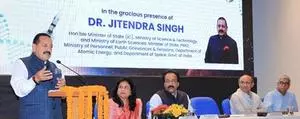
Dr Jitendra Singh says India to have its own space station by 2035
text_fieldsNew Delhi: Dr Jitendra Singh, the Union Minister of State (Independent Charge) for Science and Technology, announced on Saturday that India will establish its own space station by 2035, which it will call the "Bharatiya Antriksh Station."
He made the remark at the signing of a historic MoU between the Department of Biotechnology (DBT) and the Indian Space Research Organisation (ISRO), which intends to combine biotechnology and space technology and usher in a new age of scientific innovation in the nation.
The MoU outlines several key initiatives, including the establishment of a ‘Bharatiya Antriksh Station’ and the unveiling of the ‘BioE3’ (biotechnology for economy, environment and employment) policy.
According to the government, the collaboration will focus on areas such as microgravity research, space biotechnology, space biomanufacturing, bioastronautics, and space biology.
The minister lauded ISRO Chairman S. Somnath and Secretary of, the Department of Biotechnology, Dr Rajesh Gokhale, for their efforts in making this collaboration possible.
"The public-private participation has been instrumental in the rapid growth of India’s space sector," said Dr Singh, adding that the number of space startups has grown significantly, with nearly 300 startups now contributing to the space economy.
This partnership is expected to benefit the national human space programme and spur innovations in human health research, novel pharmaceuticals, regenerative medicine, and bio-based technologies for efficient waste management and recycling.
Dr Singh also acknowledged the Department of Biotechnology’s role in developing the first-ever DNA vaccine, which brought global recognition to India’s scientific capabilities.
In September, the Union Cabinet approved the fourth mission to the Moon and also gave a green signal for the building of the first unit of the Bharatiya Antriksh Station (BAS) by 2028. The government had envisaged an Indian Space Station by 2035 and an Indian to land on the lunar surface by 2040. Towards this goal, the Cabinet approved the development of the first module of BAS-1.
With inputs from IANS






















